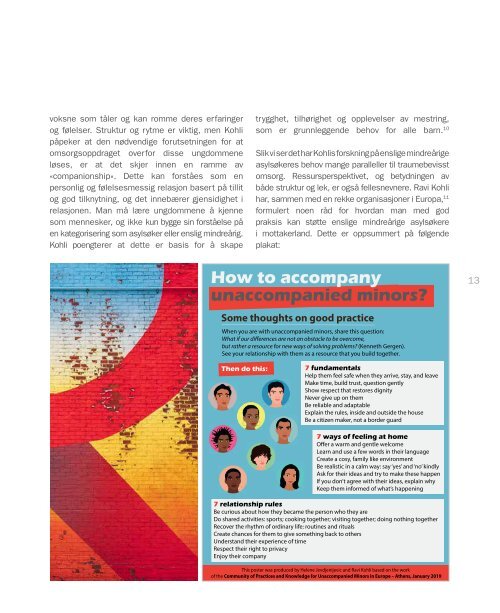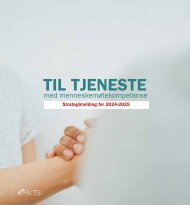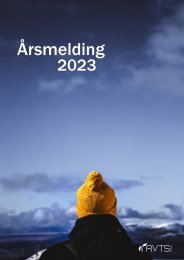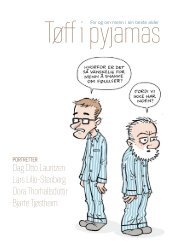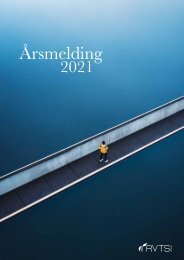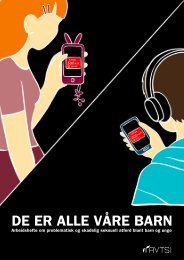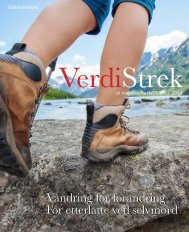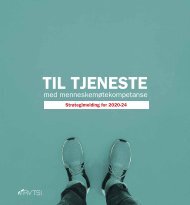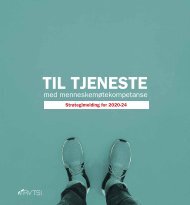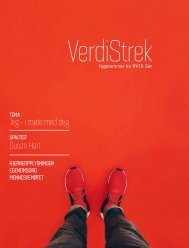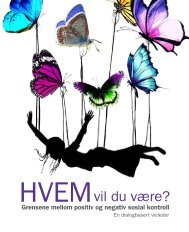Traumebevisst og relasjonsbasert omsorg
Veileder for ansatte i statlige mottak for enslige mindreårige asylsøkere.
Veileder for ansatte i statlige mottak for enslige mindreårige asylsøkere.
Create successful ePaper yourself
Turn your PDF publications into a flip-book with our unique Google optimized e-Paper software.
voksne som tåler <strong>og</strong> kan romme deres erfaringer<br />
<strong>og</strong> følelser. Struktur <strong>og</strong> rytme er viktig, men Kohli<br />
påpeker at den nødvendige forutsetningen for at<br />
<strong>omsorg</strong>soppdraget overfor disse ungdommene<br />
løses, er at det skjer innen en ramme av<br />
«companionship». Dette kan forståes som en<br />
personlig <strong>og</strong> følelsesmessig relasjon basert på tillit<br />
<strong>og</strong> god tilknytning, <strong>og</strong> det innebærer gjensidighet i<br />
relasjonen. Man må lære ungdommene å kjenne<br />
som mennesker, <strong>og</strong> ikke kun bygge sin forståelse på<br />
en kategorisering som asylsøker eller enslig mindreårig.<br />
Kohli poengterer at dette er basis for å skape<br />
trygghet, tilhørighet <strong>og</strong> opplevelser av mestring,<br />
som er grunnleggende behov for alle barn. 10<br />
Slik vi ser det har Kohlis forskning på enslige mindreårige<br />
asylsøkeres behov mange paralleller til traumebevisst<br />
<strong>omsorg</strong>. Ressursperspektivet, <strong>og</strong> betydningen av<br />
både struktur <strong>og</strong> lek, er <strong>og</strong>så fellesnevnere. Ravi Kohli<br />
har, sammen med en rekke organisasjoner i Europa, 11<br />
formulert noen råd for hvordan man med god<br />
praksis kan støtte enslige mindreårige asylsøkere<br />
i mottakerland. Dette er oppsummert på følgende<br />
plakat:<br />
How to accompany<br />
unaccompanied minors?<br />
Some thoughts on good practice<br />
When you are with unaccompanied minors, share this question:<br />
What if our differences are not an obstacle to be overcome,<br />
but rather a resource for new ways of solving problems? (Kenneth Gergen).<br />
See your relationship with them as a resource that you build t<strong>og</strong>ether.<br />
13<br />
Then do this:<br />
7 fundamentals<br />
Help them feel safe when they arrive, stay, and leave<br />
Make time, build trust, question gently<br />
Show respect that restores dignity<br />
Never give up on them<br />
Be reliable and adaptable<br />
Explain the rules, inside and outside the house<br />
Be a citizen maker, not a border guard<br />
7 ways of feeling at home<br />
Offer a warm and gentle welcome<br />
Learn and use a few words in their language<br />
Create a cosy, family like environment<br />
Be realistic in a calm way: say ‘yes’ and ‘no’ kindly<br />
Ask for their ideas and try to make these happen<br />
If you don’t agree with their ideas, explain why<br />
Keep them informed of what’s happening<br />
7 relationship rules<br />
Be curious about how they became the person who they are<br />
Do shared activities: sports; cooking t<strong>og</strong>ether; visiting t<strong>og</strong>ether; doing nothing t<strong>og</strong>ether<br />
Recover the rhythm of ordinary life: routines and rituals<br />
Create chances for them to give something back to others<br />
Understand their experience of time<br />
Respect their right to privacy<br />
Enjoy their company<br />
This poster was produced by Helene Jevdjenijevic and Ravi Kohli based on the work<br />
of the Community of Practices and Knowledge for Unaccompanied Minors in Europe – Athens, January 2019<br />
With the financial support of the Erasmus+ Youth Pr<strong>og</strong>ram


